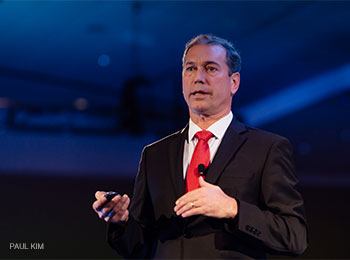
WASHINGTON, D.C.—Emergency physicians who think that health policy is only an issue for elected leaders or the C-suite, really don’t have that luxury anymore. The money to fund health care is simply too tied to policy reform, said Randy Pilgrim, MD, FACEP, at this year’s Colin C. Rorrie, Jr. Lecture.
Explore This Issue
ACEP17 Tuesday Daily News“There are many of us in this room that work in academic or employed facilities where you don’t have visibility or you have a layer of insulation between you and that reality,” said Dr. Pilgrim, enterprise chief medical officer for Schumacher Clinical Partners of Lafayette, Louisiana. “It’s my opinion that layer of insulation is going away very quickly. And hospitals under duress themselves are going to start dissecting and looking: Where are my costs? Where’s my revenue?”
And that will lead them to emergency departments. Dr. Pilgrim said the specialty’s rank-and-file need to get involved. Learn more about the issues central in a given institution. Write and submit editorials. Attend events like Wednesday’s White Coat Day on Capitol Hill.
Dr. Pilgrim’s lecture, titled “United We Stand: The Influence of Emergency Physicians on Key Health and Public Policy Issues,” paints health policy as having four main domains: the impact on patients, the impact on practices, the impact on payment. and the overall impact of the delivery system.
In the payment silo, ACEP’s policy team has worked to build an alterative payment model (APM) dubbed the acute unscheduled care model (AUCM). It is one of two proposals ACEP is working on, and it focuses on payments tied to transitions of care. ACEP has also fought to ensure that insurance companies are paying for what they should be, either via a lawsuit over non-transparent methods or through challenges to stricter interpretations of the prudent layperson standard.
“At the end of the day, if this doesn’t get fixed, either patients or providers or hospitals are going to bear the cost, when insurance companies are actually on the hook to do it already legislatively,” Dr. Pilgrim said.
He understands that learning about health care policy can be “dizzying.” However, he said that policy changes affect bedside care directly. Take the opioid crisis, which has become part of the national health care conversation via President Donald Trump’s declaration of a public health emergency.
“Interesting that a health policy issue makes it all the way to the bedside,” Dr. Pilgrim said. “But with narcotics, opioids, standing orders, and even Medicaid prescriptions, it really is doing that.”
Pages: 1 2 | Multi-Page





No Responses to “Get Involved in Health Policy or Get Left Behind”